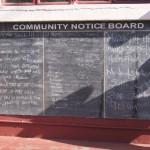: Key Theoretical Distinctions in Community-based Health Interventions
Blog post by Berkeley Franz
 Community-based health projects have become quite popular as a means to promote sustainable and relevant health care. Particularly important to the success of these projects is an emphasis on incorporating local perspectives on health and illness and encouraging full participation by community members. At the core of this community-based methodology is an epistemological shift, which emphasizes local definitions of knowledge. Community-based philosophy, influenced by phenomenology, suggests that knowledge is interpreted, rather than objective. As a result, understanding problems within a particular community requires dialogue with local persons. In other words, knowledge cannot simply be brought in from the outside because meanings about health and illness are interpreted within particular contexts.
Community-based health projects have become quite popular as a means to promote sustainable and relevant health care. Particularly important to the success of these projects is an emphasis on incorporating local perspectives on health and illness and encouraging full participation by community members. At the core of this community-based methodology is an epistemological shift, which emphasizes local definitions of knowledge. Community-based philosophy, influenced by phenomenology, suggests that knowledge is interpreted, rather than objective. As a result, understanding problems within a particular community requires dialogue with local persons. In other words, knowledge cannot simply be brought in from the outside because meanings about health and illness are interpreted within particular contexts.
This shift in philosophy, while important for community-based work, raises significant questions about how health projects can be evaluated properly and whether they remain tied to a community. For example, if beliefs about healthcare are interpretive, can meaningful conclusions be drawn from community-based projects? We suggest four important distinctions that clarify the relationship between interpretation and reliable evidence in community-based health projects. Many questions arose, related to these distinctions, while working on a health project on the island of Grenada.
For example, in this project we trained lay community health workers to provide primary health care. Community members were significant in this role because local knowledge on health and illness contributes to relevant solutions to many health problems. However, the importance of local knowledge of health issues is supported by health planning research. Lay health workers, for example, have been successful in improving health care in a variety of contexts.
For this reason, we think that these theoretical clarifications will help social planners explain the importance of community-based philosophy and the connection to generalizable information in different health care interventions.
You can access this article for free for the next 30 days by using THIS LINK.
After you’ve had a chance to read this piece, please share your thoughts, ideas, or experiences with our community so we can continue this discussion! The AR+ site is hosting a discussion forum for us to talk about our reactions and experiences related this topic. You can access the discussion forum HERE.
A quick (and free) registration is all that’s needed to join the discussion.
- Making Public Deliberations Inclusive with Mixed Methods AR - October 26, 2020
- Participatory action research with Aboriginal Elders: Ngulluk Koolunga Ngulluk Koort project - October 12, 2020
- Bringing the relational self to ART: Interview with Dr. Yvonne Skipper - October 1, 2020


